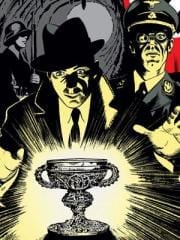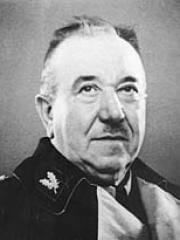Winckler-Dechend
Otto Rahn y la Búsqueda Nazi por el Secreto de los Cátaros
La Berlin de entreguerras era una ciudad conocida en toda Europa por su sub-cultura bohemia y sus jovenes intelectuales. Entre los personajes que ardientemente celebraban los abundantes «ismos» que estaban fracturando las viejas certezas ideologicas, las cuales habian compactado el siglo XIX, pocos individuos eran mas coloridos que un joven de ojos verdes y cabellos oscuros llamado Otto Rahn. Su figura delgada, envuelta en un caracteristico abrigo negro y sombrero tiroles, arrojaba una larga sombra desde esos anos sombrios, una «gran silueta» alrededor de la cual se han acumulado los mitos mas extravagantes. El fue considerado igualmente como mason, rosacruz, luciferino, y un agente de la Sociedad Thule. Como lo plantea el autor Phillip Kerr, los contemporaneos de Rahn no se habrian sorprendido de ver «la Dama Escarlata y la Gran Bestia salir volando desde la puerta del frente» de su apartamento en Tiergartenstrasse. Uno de sus companeros de la Orden Negra de Heinrich Himmler comento en un memorandum interno que el «medio sospechaba que Rahn tenia relaciones con el pueblo pequeno».
В поисках утраченного Грааля
Берлин между мировыми войнами был городом, известным по всей Европе своей богемной субкультурой молодых интеллектуалов. Среди лиц, которые горячо обсуждали много модернистских "измов", которые ломали старые идеологические определения, что склеивали 19-ое столетие, немногие были более колоритными, чем этот темноволосый, зеленоглазый молодой человек по имени Отто Вильгельм Ран. Его худая фигура, одетая в характерный черный плащ и фетровую шляпу, бросает длинную тень из тех сумеречных лет, ‘великий силуэт’, вокруг которого вращались самые невероятные мифы. Он, как говорили, был Масоном, Розенкрейцером, Люциферианцем, посланцем Общества Туле, посвященным Катаром и даже руководителем некоего неизвестного международного тайного общества.
Karl Maria Wiligut, le mentor secret d’Himmler
Manfred Lenz, Dimanche, 30 Avril 2006
Un entretien avec Gabriele Winckler-Dechend<
Madame Winckler, vous avez personnellement connu Wiligut. Quand avez-vous été employée par lui au cabinet du Reichführer SS, Heinrich Himmler ?
Le colonel Wiligut était un ami de ma mère bien avant 1933 et elle était très intéressée par sa « Tradition ». A cause de cela, elle lui rendait souvent visite à ??? ou Wiligut possédait une petite maison depuis la fin de la première guerre mondiale. Elle était entourée d’un jardin qu’il cultivait lui-même pour nourrit sa famille.
Ce doit être en 1933 que le colonel fut persécuté en Autriche, du fait de ses liens avec Schönerer et Lüger .
Raiders of the Lost Grail
Berlin between the wars was a city known throughout Europe for its bohemian subculture of young intellectuals. Amongst the personalities who hotly debated the many modernist “isms” that were fracturing the old ideological certainties which had glued together the 19th century, few individuals were more colourful than a dark-haired, green-eyed young man named Otto Wilhelm Rahn. His gaunt figure, swathed in characteristic black coat and fedora, casts a long shadow out of those twilight years, a ‘great silhouette’ around which the most extravagant myths accrued. He was variously said to be a Mason, a Rosicrucian, a Luciferian, an agent of the Thule Gesellschaft, an initiated Cathar and even the leader of an obscure, international secret society. As author Philip Kerr puts it, Rahn’s contemporaries might not have been surprised to see “the Scarlet Woman and the Great Beast come flying out of the front door” of his apartment on Tiergartenstrasse. One of his Nazi peers in Heinrich Himmler’s Black Order remarked in an internal memo that he “half suspected Rahn of being in league with the little people”. To this day, it is widely believed that this enigmatic young man knew the whereabouts of one of the most sacred relics in all Christendom – the Most High Holy Grail. But the truth is stranger still…



Comentarios recientes
hace 13 años 17 semanas
hace 13 años 17 semanas
hace 13 años 17 semanas
hace 13 años 18 semanas
hace 13 años 21 semanas
hace 13 años 26 semanas